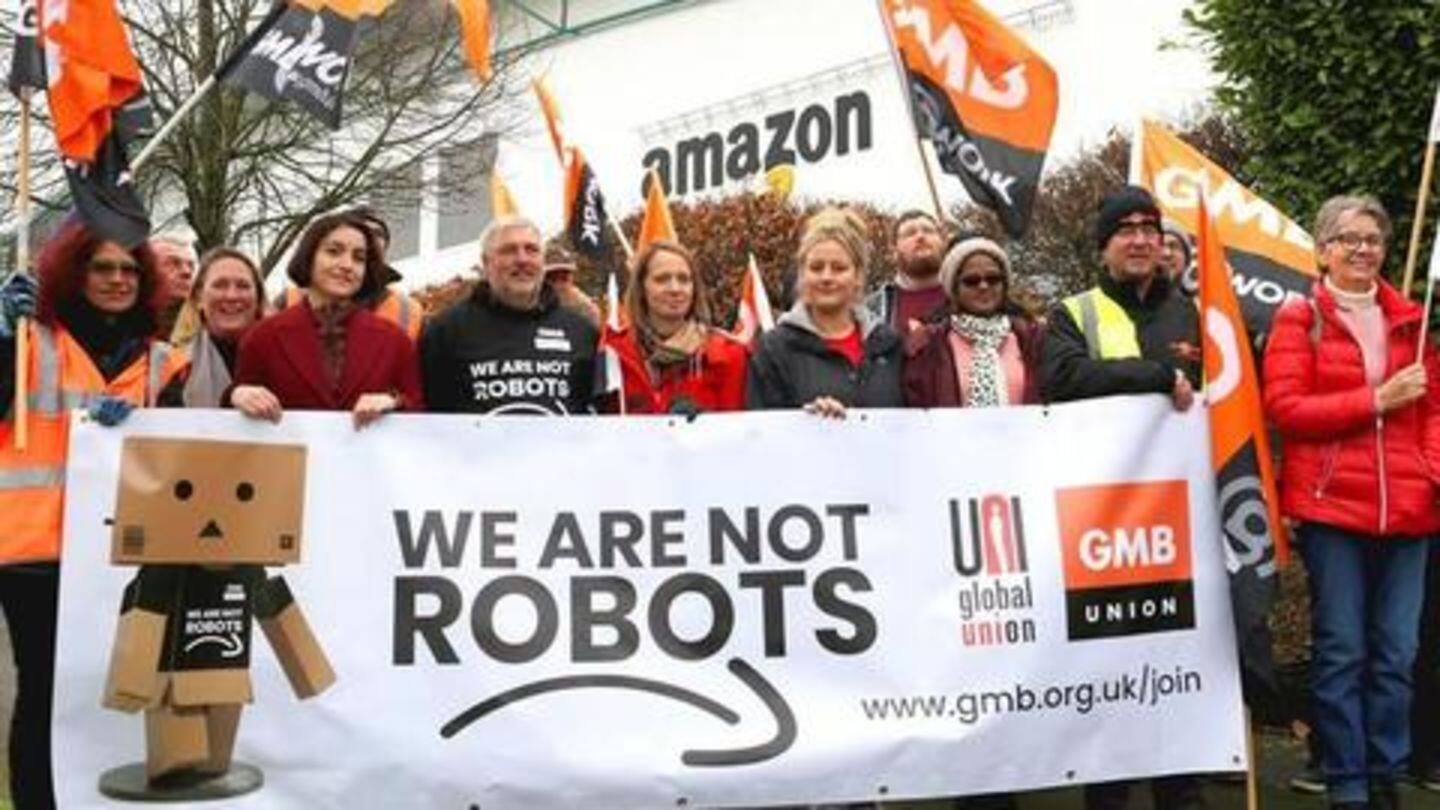
'We aren't robots': Workers' protests highlight Amazon's oppressive practices again
What's the story
While many were enjoying the spoils of Amazon's Black Friday, hundreds of Amazon warehouse workers in Germany, Spain, and France walked out to protest warehouse working conditions. Although Amazon has downplayed the protests across Europe, this isn't the first time that the e-commerce giant has been accused of having downright dismal working conditions at its warehouses. Here's more.
Protests
Details of the protests across Europe
Bearing banners like 'We are not robots', around 600 workers at Amazon's Bad Hersfeld facility in Germany walked out on Friday morning local time. Meanwhile, over 500 Amazon workers in the UK demonstrated at five Amazon warehouses, and workers at Amazon's Madrid-area San Fernando de Henares facility, which hires 1,800 people, planned a two-day strike to protest against dismal working conditions at Amazon facilities.
Amazon
What Amazon had to say about the protests
Amazon, however, downplayed the protests, disputing the level of protest participation that has been claimed by unions. Saying that the 'small-scale' protests did not disrupt any operations, Amazon, in an email, said that it had created 75,000 permanent jobs in Europe since 2010, and that it provides "highly competitive pay, full benefits" and ensures "safe and positive working conditions" at its fulfillment centers.
Workers
Amazon's textbook reply shouldn't be taken at face value
Amazon's textbook reply, however, should be taken with a grain of salt. Despite being one of the world's most valuable companies, many of Amazon's US workers receive government support for basic needs like food and healthcare. Further, while protests in the US are unheard of due to the lack of unions, Amazon faces frequent worker backlashes in Europe.
Evidence
There's plenty of evidence to support workers' narratives
Evidence, too seems to support the workers' narratives. In March this year, famed British journalist James Bloodworth, who worked undercover at an Amazon fulfillment center in the UK for six months, revealed disturbing details. In his book titled Hired: Six Months Undercover in Low-Wage Britain, Bloodworth said that Amazon workers at his warehouse were forced to urinate in bottles, and had to often forego toilet breaks to meet Amazon's rising fulfillment demands.
Evidence
Over half of Amazon's UK workers reported suffering from depression
Interestingly, Bloodworth's findings were in line with recent first-hand records collected in a survey by workers' rights platform, Organize. The survey by Organize, which covered over 240 Amazon warehouse workers in the UK, revealed that 74% of workers avoided toilet breaks for fear of missing targets and getting fired. Even more disturbingly, 55% reported suffering from depression after starting to work for Amazon.
Evidence
Workers have reported unfair practices and adverse mental health impacts
Organize's survey also found that 57% of the employees surveyed reported rising anxiety levels. 55% of the workers reported unfair warnings over illness - "from their [Amazon's] point of view, we don't have the right to be ill", said one employee. Additionally, 81% of the employees said they'd not apply for an Amazon job again, and a handful reported having suicidal thoughts.
Evidence
Amazon facilities in China flout labor regulations
Further, a nine-month-long investigation by New York-based labor watchdog, China Labor Watch (CLW), revealed even worse conditions at China's Hengyang Amazon facility. CLW, in a report released in June, revealed that 40% of the workers at the facility were temporary workers (far exceeding China's 10% limit) who received no compensation for sick leaves, weren't paid extra for overtime, and received inadequate pre-job safety training. Peak season work hours were reportedly inhuman.
Evidence
Workers put in inhuman overtime hours during peak season
CLW found that during peak season, workers at the Foxconn-owned Amazon facility had to put in 100 hours of overtime work monthly, against China's legal limit of 36 hours of monthly overtime. In one instance, workers reported working for 14 consecutive days during peak season. CLW also found that Amazon laid off its temporary workers in the off-season, thus leaving them with no income.
Evidence
Amazon workers earn lower wages than the regional average
In terms of wages too, CLW found glaring issues at the Chinese facility in Hengyang. As opposed to average monthly wages of $725.22 in Hengyang, regular workers at the factory earned between $312.12-$468.19 during off-season. Additionally, CLW found that workers weren't allowed to work overtime during off-season, which took away workers' opportunities to supplement their already low incomes.
To conclude
Who will hold Amazon accountable?
Of course, Amazon had downplayed or dismissed the aforementioned surveys and reports too, and had provided one excuse or the other as an explanation. That said, as protests proliferate and the body of evidence pointing towards Amazon's oppressive workplace practices grows, the world's largest e-commerce company will have to be held accountable someday. The only question is when.